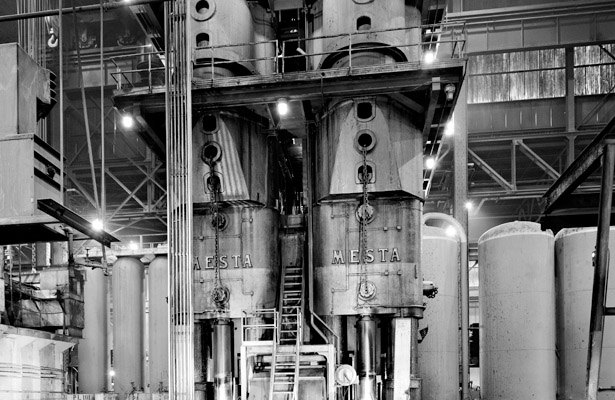Return Of The Iron Giant

It is this power, combined with amazing precision—its tolerances are measured in thousandths of an inch—that gives the Fifty its far-reaching utility. It has made essential parts for industrial gas turbines, helicopters, and spacecraft. Every manned U.S. military aircraft now flying uses parts forged by the Fifty. So does every commercial aircraft made by Airbus and Boeing.
So says The Atlantic in a fascinating short piece about the rehabilitation of the Alcoa Fifty. In one of those examples of government-industry collaboration that twists the knickers of libertarians and ultra-liberals alike, the United States Government sponsored a “Heavy Press Program” after World War II so American industry could forge massive aircraft parts. The presses were paid for with public money then used by private companies such as Alcoa. Having been brought back to life after a shutdown, the Fifty will now make parts for the Joint Strike Fighter and operate for at least thirty more years.
Russia has a 75,000-ton press, and the Chinese are working on an 80K monster. Without a press of the Fifty’s scale, it is impossible for an individual nation to build large-scale aircraft without outside assistance.
So… if large-scale government intervention and engineering assistance has made the Jet Age possible, why couldn’t something similar be done for American industry?
It’s very tempting to draw some sort of generic lesson concerning this country from a compare-and-contrast between 1950 and 2009. Sixty-two years ago, it was assumed that American know-how and engineering were equal, or superior, to what any other country had to offer. Furthermore, it was assumed that America would build the future, not leverage it, hostile-takeover it, credit-default-swap it, download it, or watch it happen overseas. The Heavy Press Program was based around that idea that the American Government would build the presses and American companies would use them to ensure the greatness of America. That idea was a sound one, and it worked.
When the “bailout” happened, there was no talk about greatness, or innovation, or the future in the Donald Fagen “I.G.Y.” sense. Instead, an unthinkable amount of money was borrowed from China and others then handed over to GM and Chrysler. Chrysler later on became a partner with FIAT, while General Motors continued to pursue an aggressive program of manufacturing expansion in China, Mexico, and elsewhere while mailing-off the major portions of its small-car programs to Korea.
If the United States Government in 1950 was playing the role of the father who agrees to buy tools so his son can build a Pinewood Derby car and win an important competition, in 2012 it played the role of indulgent grandmother to a pair of crackheads, handing cash to people who promise to clean up and get a job right after they score their next hit. The bailout may well have saved the American auto industry, and it almost certainly prevented a major section of the economy from simply disappearing, but it didn’t do anything to promote greatness. The “Fifty” produced the Boeing jet bombers and a global era of American aeronautical dominance; the bailout produced the Volt Dance.
It’s also tempting to suggest that there should be some sort of governmental program to produce the next step in personal mobility, but the truth is the country needs energy answers a lot more urgently than it needs a 100-mpg super-hybrid, even if such a thing could be built. One of the commenters on the Atlantic article suggested a “Heavy Fusion Program”, which is probably closer to the mark. A Manhattan-Project-style national effort centered around creating a safe, future-proofed source of energy would do more to promote world peace and harmony than anything else.
One thing nobody is suggesting doing, obviously, is building a press to match or beat the new Chinese giant. This is 2012. The Space Shuttle is grounded, the American teenager is on Facebook, and the future is made in China.

More by Jack Baruth
Latest Car Reviews
Read moreLatest Product Reviews
Read moreRecent Comments
- Kjhkjlhkjhkljh kljhjkhjklhkjh [h3]Wake me up when it is a 1989 635Csi with a M88/3[/h3]
- BrandX "I can charge using the 240V outlets, sure, but it’s slow."No it's not. That's what all home chargers use - 240V.
- Jalop1991 does the odometer represent itself in an analog fashion? Will the numbers roll slowly and stop wherever, or do they just blink to the next number like any old boring modern car?
- MaintenanceCosts E34 535i may be, for my money, the most desirable BMW ever built. (It's either it or the E34 M5.) Skeptical of these mods but they might be worth undoing.
- Arthur Dailey What a load of cow patties from fat cat politicians, swilling at the trough of their rich backers. Business is all for `free markets` when it benefits them. But are very quick to hold their hands out for government tax credits, tax breaks or government contracts. And business executives are unwilling to limit their power over their workers. Business executives are trained to `divide and conquer` by pitting workers against each other for raises or promotions. As for the fat cat politicians what about legislating a living wage, so workers don't have to worry about holding down multiple jobs or begging for raises? And what about actually criminally charging those who hire people who are not legally illegible to work? Remember that it is business interests who regularly lobby for greater immigration. If you are a good and fair employer, your workers will never feel the need to speak to a union. And if you are not a good employer, then hopefully 'you get the union that you deserve'.































Comments
Join the conversation
Here's a 1983 report on whether or not we need anything larger than a 50kt press: http://www.dtic.mil/dtic/tr/fulltext/u2/a132398.pdf The gist is, we don't. The reason isn't explicitly outlined in the report. My roommate and I sat around and did some digging, and as far as we can figure, the only thing you'd make that would require this kind of capacity is tank armor. Since our tanks use a composite armor, we don't need a big-ass press. Then there's always the simple point that China doesn't have a press of that capacity and they'd like to. It's not only a point of national prestige, but it also means they can make steel tank armor and their own aerospace components. If you're gonna build one of these things, you might as well go big, right? Meanwhile we've had two 50kt presses for the last fifty years, and I imagine if we needed something slightly larger, we can call up the consortium in France with a 65kt press, or order something off Russia's 75kt.
Yeah! This is Amerika! Where we roll up our sleeves and the Gov. builds/does one big thing (The Fifty, A-bomb, Moon walking, Interstates, insert your fav and yell "Amerika ##ck Yeah!") and that leads (business and industry) us to the promised land. Kennedy was always right "Ask not what your country can do for you...". Individual entrepreneurship and risk taking was the hallmark of our great-grandparents. The future is as likely to come from a gal in a clapped out barn burning the midnight oil on jamming software on his 3D printer/machine tool robotic kludge as from any R&D department. Anyone of you can be a global competitor because the tools are in front of you: 1) un##cking believable technology, 2) cheap transoceanic shipping, 3) fabulous global communications, 4) a knowledge base that refuses to stop growing. Quit whining, pick up the rock, smack the bone, taste the marrow.